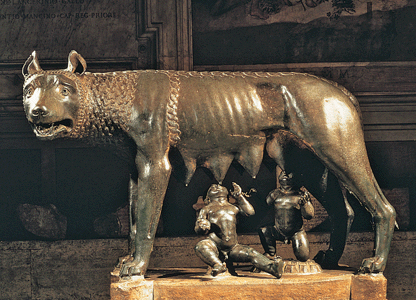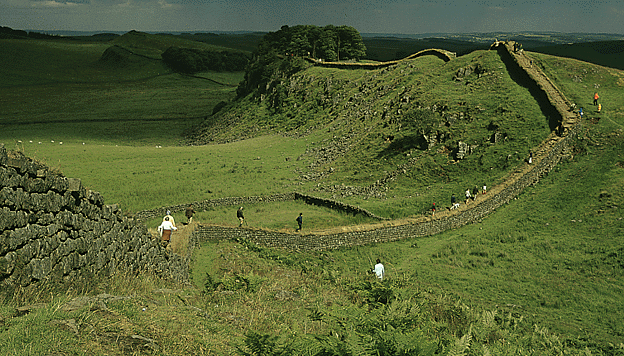Happy 2,767th (?) Birthday, Rome!
Monday, April 21st, 2014April 21, 2014
Rome, the Eternal City, is celebrating its birthday today. Officially, the city is now 2,767 years old. However, a recent archaeological discovery suggests that Rome may actually be 200 years older that.
According to popular tradition, the city was founded on April 21, 753 B.C., by legendary twins Romulus and Remus. They were the sons of Mars, the Roman god of war. An evil king ordered the infant twins placed in a basket and thrown into the Tiber River. After floating downstream, the twins were washed ashore. A female wolf found the infants and nursed them. As adults, they founded the first settlement at Rome. Later, a dispute between the brothers led to the death of Remus, and Romulus named the city for himself. Romulus, Remus, and the wolf became an important symbol of Rome. Several ancient statues show the babies with their animal protector.

The legendary founders of Rome were twin brothers named Romulus and Remus. According to Roman mythology, a wolf nursed them as babies. (Bronze sculpture; Museum del Palazzo dei Conservatori, Rome (SCALA/Art Resource))
Since 2009, archaeologist Patrizia Fortuni, of the Cultural Superintendency of Rome, has led excavations at Lapis Niger, an ancient Roman shrine built of black rock in the center of the Roman Forum. In a previous excavation, the site produced an artifact known as the lex sacra, which is inscribed with the oldest known example of Latin writing, dated to 565 B.C. In even deeper levels, the archaeologists uncovered pieces of an ancient wall beneath the Forum that was constructed from tufa, a kind of limestone, beneath the site. Fragments of pottery and preserved grain were also recovered from this lowest level. The pottery fragments allowed the archaeologists to use a technique called seriation to establish a chronological date for the limestone wall of between about 900 and 800 B.C., about 200 years older than the date of the traditional origin of the city.
The Roman poet Virgil wrote of the legend of Romulus and Remus around 30 B.C. in the Aeneid, one of the world’s greatest poems of heroic adventure. Virgil drew from earlier legends and folklore for his famous work, which became the national epic of ancient Rome. But archaeologists and historians have long known that the legend of Rome’s founding had little basis in fact. Archaeological evidence shows the city formed through a gradual process of settlement by people called the Latins over many years around the area of the Palatine Hill. Over many years, the small farming community known as Latium on the bank of the Tiber River in central Italy grew to become the capital of one of the greatest empires in history.
Additional World Book articles:




